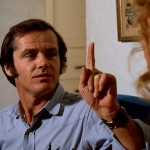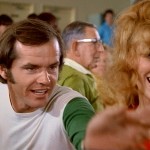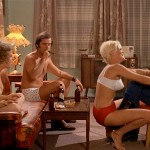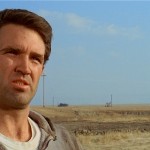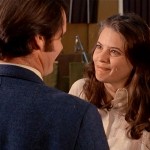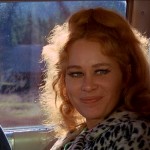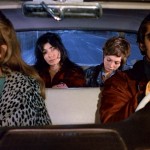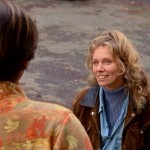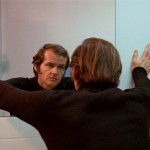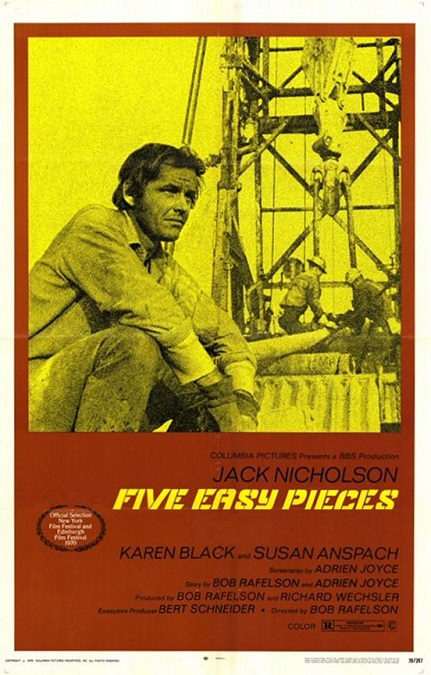
Five Easy Pieces – 1970
This movie was confusing in more ways than one. First, I couldn’t understand what the main characters’ motivations were. Then I couldn’t understand why critics loved it so much. I mean it had a rather sparse plot and not much of a definitive point. So what did it have? Why was it nominated for the Best Picture of 1970?
It was directed by Bob Rafelson, and starred Jack Nicholson as Robert Dupea, a man who was raised as a piano prodigy, but for some reason which is never really explained, he decides to leave his life of privilege to become an oil rig laborer. He never seems to be happy with either his job or his clingy girlfriend Rayette Dipesto, played by Karen Black. He likes his best friend Elton, played by Billy “Green” Bush, well enough, though he showed signs of contempt for even him. Robert spends his life searching for something, but he has no idea for what or where to look.
He does his best to fit into his chosen lower-middle-class life but he seems to be tormented the tediousness that it entails. Then problems begin to mount, driving him to further seek for meaning in his life. Rayette, who he does not love, becomes pregnant, Elton is arrested and taken away, and he learns that his father has had two strokes, and has become an invalid.
He returns to the home of his childhood and tries to reconcile himself to his family, his sister, Partitia, played by Lois Smith, his brother, Carl, played by Ralph Waite, And Carl’s wife, Catherine Van Oost, played by Susan Anspach, but is reminded of why he left that life in the first place. He hates the pretentiousness and snobbishness of the upper-class people and their smug, superior ways. Rayette joins him at his family’s house, but her lower class origins put her at odds with everyone. So Robert leaves in anger and disillusionment.
The film’s bleak ending was, I think, supposed to be profound, but I just saw it as another example of his character running away from a life that he hates, hurting everyone around him in the process. It was hard for me to identify with such a directionless and self-centered character.
It isn’t that it wasn’t a good film, though I wouldn’t call it great either. But when I read, for example, Roger Ebert’s review, I think I caught a small glimpse of what the film was really about. He said, “The film, one of the best American films, is about the distance between that boy, practicing to become a concert pianist, and the need he feels twenty years later to disguise himself as an oil-field rigger. When we sense the boy, tormented and insecure, trapped inside the adult man, Five Easy Pieces becomes a masterpiece of heartbreaking intensity….The movie is joyously alive to the road life of its hero. We follow him through bars and bowling alleys, motels and mobile homes, and we find him rebelling against lower-middle-class values even as he embraces them. In one magical scene, he leaps from his car in a traffic jam and starts playing the piano on the truck in front of him; Robert Eroica Dupea is one of the most unforgettable characters in American movies.”
Well, I don’t think I’d go as far as to say that, but maybe I can understand the concept of a severely emotionally crippled man who is like a child trapped in the body of an adult. Ebert uses words like ‘intensity’, ‘magical’, and ‘unforgettable’, but I didn’t feel any of those things. Unless… unless, the character was speaking for a generation, a society of young men and women who, like him, were searching for meaning in a world that was profoundly unsatisfying, and growing more and more out of control every day. Perhaps Robert somehow represented the generation of hippies who were ready to move away from their free and easy youth, but who did not know where to go.
However, not having lived through the 60s or 70s, not having been alive during all the social and political upheaval of the era, and not having been around during the uncertainty of the Vietnam War, I might be missing out on some of the deeper meanings of this strange little film.
